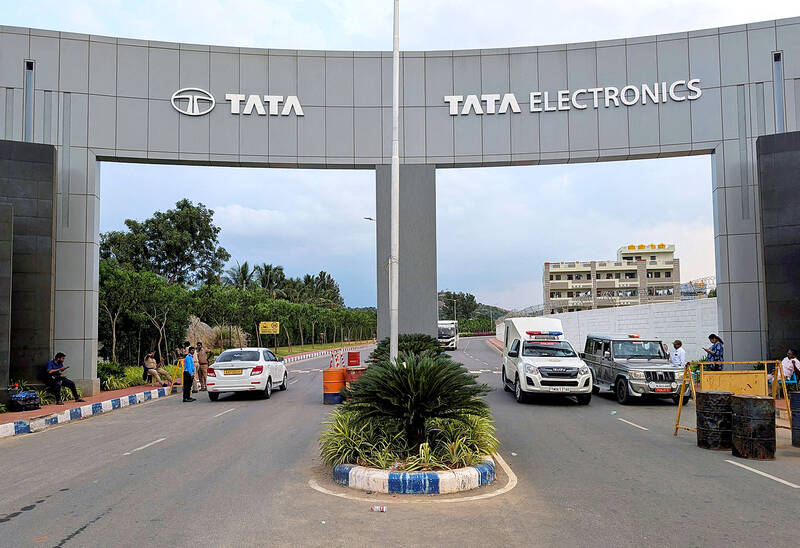An Indian factory producing iPhone components resumed work yesterday after a fire that halted production — the third blaze to disrupt Apple Inc’s local supply chain since the start of last year.
Local industrial behemoth Tata Group’s plant in Tamil Nadu, which was shut down by the unexplained fire on Saturday, is a key linchpin of Apple’s nascent supply chain in the country.
A spokesperson for subsidiary Tata Electronics Pvt yesterday said that the company would restart work in “many areas of the facility today.”

Photo: Reuters
“We’ve been working diligently since Saturday to support our team and to identify the cause of the fire,” the spokesperson said.
The conglomerate did not say when the facility would resume full production or whether the fire would result in shipment delays. Analysts had initially projected a delay in production of older iPhone models.
The fire is the latest incident to affect Apple’s supply chain in India, with two other blazes temporarily halting production at factories owned by Taiwanese suppliers Pegatron Corp (和碩) and Foxlink Group (正崴) last year.
India has been a major beneficiary of Apple’s decision to broaden its production outside of China. The company plans to also start locally manufacturing AirPods, its wireless earphones, at a facility owned by Taiwanese electronics giant Foxconn Technology Group (富士康), the Times of India reported yesterday.
Foxconn, a principal assembler of iPhones, is also in the process of building a major phone assembly plant near Bengaluru, the country’s principal information technology hub.
Other tech companies have followed suit, with Google this year beginning the local manufacture of its flagship Pixel 8 smartphone.
Tamil Nadu, where the Tata factory is based, has worked to cultivate its high-tech manufacturing industry. Tamil Nadu Chief Minister M.K. Stalin concluded a whirlwind tour of the US last month, securing fresh investment commitments worth nearly US$900 million, local media reports said.
Key deals include promises from Finnish tech giant Nokia and payments firm PayPal to set up research and artificial intelligence development centers in the state.

Taiwan Semiconductor Manufacturing Co (TSMC, 台積電) secured a record 70.2 percent share of the global foundry business in the second quarter, up from 67.6 percent the previous quarter, and continued widening its lead over second-placed Samsung Electronics Co, TrendForce Corp (集邦科技) said on Monday. TSMC posted US$30.24 billion in sales in the April-to-June period, up 18.5 percent from the previous quarter, driven by major smartphone customers entering their ramp-up cycle and robust demand for artificial intelligence chips, laptops and PCs, which boosted wafer shipments and average selling prices, TrendForce said in a report. Samsung’s sales also grew in the second quarter, up

LIMITED IMPACT: Investor confidence was likely sustained by its relatively small exposure to the Chinese market, as only less advanced chips are made in Nanjing Taiwan Semiconductor Manufacturing Co (TSMC, 台積電) saw its stock price close steady yesterday in a sign that the loss of the validated end user (VEU) status for its Nanjing, China, fab should have a mild impact on the world’s biggest contract chipmaker financially and technologically. Media reports about the waiver loss sent TSMC down 1.29 percent during the early trading session yesterday, but the stock soon regained strength and ended at NT$1,160, unchanged from Tuesday. Investors’ confidence in TSMC was likely built on its relatively small exposure to the Chinese market, as Chinese customers contributed about 9 percent to TSMC’s revenue last

With this year’s Semicon Taiwan trade show set to kick off on Wednesday, market attention has turned to the mass production of advanced packaging technologies and capacity expansion in Taiwan and the US. With traditional scaling reaching physical limits, heterogeneous integration and packaging technologies have emerged as key solutions. Surging demand for artificial intelligence (AI), high-performance computing (HPC) and high-bandwidth memory (HBM) chips has put technologies such as chip-on-wafer-on-substrate (CoWoS), integrated fan-out (InFO), system on integrated chips (SoIC), 3D IC and fan-out panel-level packaging (FOPLP) at the center of semiconductor innovation, making them a major focus at this year’s trade show, according

DEBUT: The trade show is to feature 17 national pavilions, a new high for the event, including from Canada, Costa Rica, Lithuania, Sweden and Vietnam for the first time The Semicon Taiwan trade show, which opens on Wednesday, is expected to see a new high in the number of exhibitors and visitors from around the world, said its organizer, SEMI, which has described the annual event as the “Olympics of the semiconductor industry.” SEMI, which represents companies in the electronics manufacturing and design supply chain, and touts the annual exhibition as the most influential semiconductor trade show in the world, said more than 1,200 enterprises from 56 countries are to showcase their innovations across more than 4,100 booths, and that the event could attract 100,000 visitors. This year’s event features 17